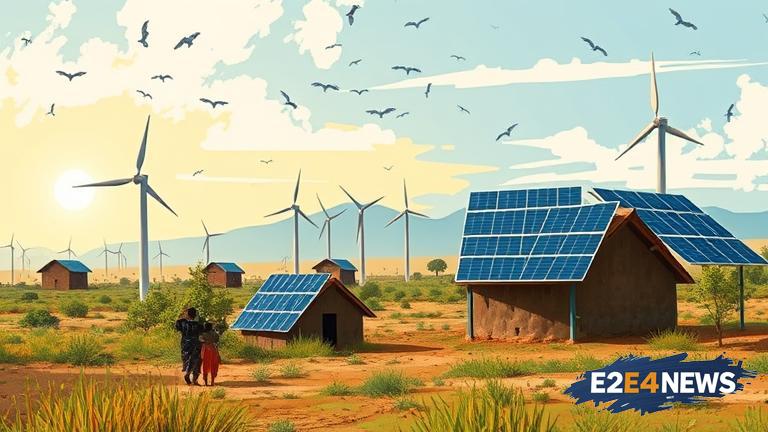The African continent is witnessing a significant shift towards renewable energy, driven by the need to address the pressing issues of energy access, climate change, and sustainable development. With many countries still struggling to provide reliable and affordable electricity to their citizens, renewable energy has emerged as a viable solution. Solar and wind power are leading the charge, with countries like South Africa, Egypt, and Morocco investing heavily in these sectors. The African Renewable Energy Initiative, launched in 2015, aims to achieve at least 300 GW of renewable energy capacity by 2030. This ambitious target is expected to create new opportunities for economic growth, job creation, and poverty reduction. In South Africa, the Renewable Energy Independent Power Producer Procurement (REIPPP) program has been instrumental in promoting private sector investment in the sector. The program has already led to the development of several large-scale solar and wind farms, with many more in the pipeline. Egypt, on the other hand, has set a target of generating 20% of its electricity from renewable sources by 2022. The country has made significant progress in this regard, with the inauguration of the Benban Solar Park, one of the largest solar parks in the world. Morocco has also been at the forefront of the renewable energy revolution, with a focus on solar and wind power. The country’s ambitious plan to generate 52% of its electricity from renewable sources by 2030 is expected to reduce its dependence on fossil fuels and lower greenhouse gas emissions. Other African countries, such as Kenya, Tanzania, and Ghana, are also making significant strides in the renewable energy sector. The Kenyan government has set a target of generating 70% of its electricity from renewable sources by 2030, while Tanzania has launched a number of initiatives to promote the development of solar and wind power. Ghana, meanwhile, has established a renewable energy authority to oversee the development of the sector. The growth of the renewable energy sector in Africa is expected to have a positive impact on the environment, with a reduction in greenhouse gas emissions and other pollutants. It will also create new opportunities for economic growth and job creation, particularly in rural areas where many renewable energy projects are located. Furthermore, the increased use of renewable energy will reduce Africa’s dependence on fossil fuels, improving energy security and reducing the impact of price volatility. The African Development Bank has also launched a number of initiatives to support the development of the renewable energy sector, including the creation of a $500 million fund to support renewable energy projects. The bank has also established a number of partnerships with other organizations to promote the development of renewable energy in Africa. In addition, the International Renewable Energy Agency (IRENA) has launched a number of initiatives to support the development of the renewable energy sector in Africa, including the creation of a renewable energy roadmap for the continent. The agency has also established a number of partnerships with African countries to promote the development of renewable energy. Overall, the renewable energy revolution in Africa is gaining momentum, driven by the need to address the pressing issues of energy access, climate change, and sustainable development. With the support of governments, international organizations, and the private sector, the continent is poised to make significant strides in the coming years, reducing its dependence on fossil fuels and promoting sustainable development.
